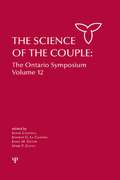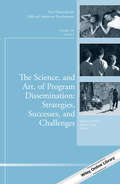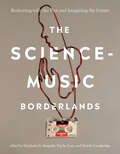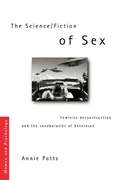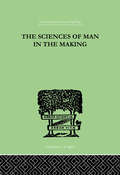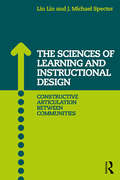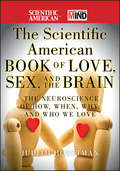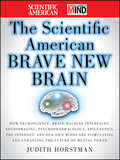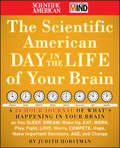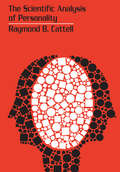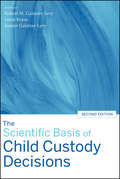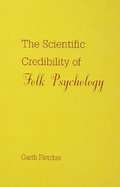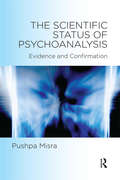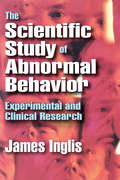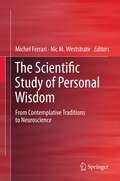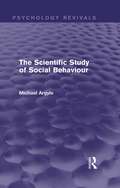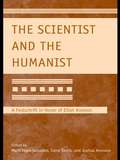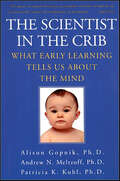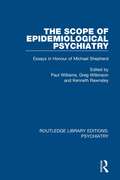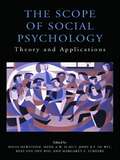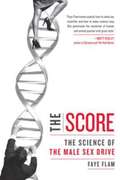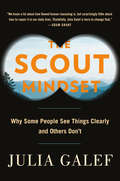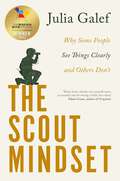- Table View
- List View
The Science of the Couple: The Ontario Symposium Volume 12 (Ontario Symposia on Personality and Social Psychology Series)
by Lorne Campbell James M. Olson Jennifer G. La Guardia Mark P. ZannaAlthough love and relationships have been focal points for poets and philosophers for thousands of years, these topics had not traditionally been the focus of empirical research. As a result, very little was known about how couples maintained happiness and satisfaction in their relationships, or how relationships deteriorated, ultimately ending in separation or divorce. However, since the early 1980s, relationships research has blossomed as a field – and is now one of the most vibrant topics in social psychology and beyond. This volume brings together the latest research on couple functioning from the perspectives of social and personality psychology, neurobiology, health, and clinical psychology. Additionally, the research presented highlights the use of survey, experimental, implicit, and longitudinal methods, as well as specialized techniques employed in neuroscience, psychophysiology, and psychoneuroimmunology in the study of couple level processes. The underlying aim of this volume is to examine how these theories and methods converge to provide a deeper, holistic model of couples’ processes and functioning. With its state-of-the-art, integrative overview of this exciting discipline, The Science of the Couple is essential reading for social psychologists, clinicians, and anyone with an interest in the dynamics of interpersonal relationships.
The Science, and Art, of Program Dissemination: New Directions for Child and Adolescent Development, Number 149 (J-B CAD Single Issue Child & Adolescent Development)
by Kathleen P. McCoy Augusto DianaGain a greater awareness of the processes involved in the dissemination of evidence-based interventions, as well as existing supports that help disseminate and sustain them. Many interventions that aim to help children and adolescents are found to be efficacious every year, but program developers are often not equipped with the skills, knowledge, or tools to understand how to scale up a program or sustain it after the initial funding. Consumers (e.g., service providers, who are consumers of interventions), on the other hand, often do not understand all that goes into implementing and scaling up an intervention. This special issue: introduces readers to the problem, discusses some of the challenges with disseminating programs, and presents various supports that exist which can help scale up and sustain interventions. The authors’ goal is to promote the field of dissemination science by encouraging the sharing ofsuccesses and challenges.This is the 149th volume in this Jossey-Bass series New Directions for Child and Adolescent Development. Its mission is to provide scientific and scholarly presentations on cutting edge issues and concepts in this subject area. Each volume focuses on a specific new direction or research topic and is edited by experts from that field.
The Science-Music Borderlands: Reckoning with the Past and Imagining the Future
by Elizabeth Hellmuth Margulis, Psyche Loui, and Deirdre LoughridgeInterdisciplinary essays on music psychology that integrate scientific, humanistic, and artistic ways of knowing in transformative ways.Researchers using scientific methods and approaches to advance our understanding of music and musicality have not yet grappled with some of the perils that humanistic fields concentrating on music have long articulated. In this edited volume, established and emerging researchers—neuroscientists and cognitive scientists, musicians, historical musicologists, and ethnomusicologists—build bridges between humanistic and scientific approaches to music studies, particularly music psychology. Deftly edited by Elizabeth H. Margulis, Psyche Loui, and Deirdre Loughridge, The Science-Music Borderlands embodies how sustained interaction among disciplines can lead to a richer understanding of musical life.The essays in this volume provide the scientific study of music with its first major reckoning, exploring the intellectual history of the field and its central debates, while charting a path forward.The Science-Music Borderlands is essential reading for music scholars from any disciplinary background. It will also interest those working at the intersection of music and science, such as music teachers, performers, composers, and music therapists.Contributors:Manuel Anglada-Tort, Salwa El-Sawan Castelo-Branco, Hu Chuan-Peng, Laura K. Cirelli, Alexander W. Cowan, Jonathan De Souza, Diana Deutsch, Diandra Duengen, Sarah Faber, Steven Feld, Shinya Fujii, Assal Habibi, Erin. E. Hannon, Shantala Hegde, Beatriz Ilari, Jason Jabbour, Nori Jacoby, Haley E. Kragness, Grace Leslie, Casey Lew-Williams, Deirdre Loughridge, Psyche Loui, Diana Mangalagiu, Elizabeth H. Margulis, Randy McIntosh, Rita McNamara, Eduardo Reck Miranda, Daniel Müllensiefen, Rachel Mundy, Florence Ewomazino Nweke, Patricia Opondo, Aniruddh D. Patel, Andrea Ravignani, Carmel Raz, Matthew Sachs, Marianne Sarfati, Patrick E. Savage, Huib Schippers, Jim Sykes, Gary Tomlinson, Jamal Williams, Maria A. G. Witek, Pamela Z
The Science/Fiction of Sex: Feminist Deconstruction and the Vocabularies of Heterosex (Women and Psychology)
by Annie PottsWhat can we learn from exploring the differences in male and female orgasmic experience? Is the penis an entity with a mind of its own? These issues and others, such as the popular portrayals of male sexuality as active and outwardly focused and female sexuality as passive and internally located, are discussed in The Science/Fiction of Sex. Contemporary feminist and poststructuralist theories of sex and gender are explored alongside an investigation of how people make sense of such concepts as heterosexuality, orgasm, sexual dysfunction, femininity and masculinity, and safer sex practice.Potts asks men and women about their actual experiences of heterosex. This interview material, combined with excerpts from sexological and medical texts and features from film and television, draws attention to the ways in which western cultural constructs influence our ideas and experiences of the body, sex, and gender. Potts also uses deconstructive theory as a textual tool, concentrating on how binary oppositions such as inside/outside and mind/body impact on our understandings of heterosex, and affect the power relations between women and men. She also examines how the radical postmodern theories of the body and sexuality proposed by Irigaray, Lyotard, and Deleuze and Guattari disrupt such dualistic modes of understanding and experiencing sexualized bodies. The Science/Fiction of Sex will be of interest to those studying women and psychology as well as gender studies, cultural studies, feminist studies, sociology, philosophy, public health and education.
The Sciences Of Man In The Making: AN ORIENTATION BOOK (International Library Of Psychology Ser.)
by Edwin A. KirkpatrickThis is Volume XVII of thirty-eight in collection on General Psychology. Originally published in 1932, this is an orientation text on the sciences of man in the making and looks at man as an inhabitant of the earth, how life is preserved, varieties of the human species, avoiding waste and the behaviour of man amongst more.
The Sciences of Learning and Instructional Design: Constructive Articulation Between Communities
by J. Michael Spector Lin LinThere are two distinct professional communities that share an interest in using innovative approaches and emerging technologies to design and implement effective support for learning. This edited collection addresses the growing divide between the learning sciences community and the instructional design and technology community, bringing leading scholars from both fields together in one volume in an attempt to find productive middle ground. Chapters discuss the implications of not bridging this divide, propose possible resolutions, and go on to lay a foundation for continued discourse in this important area.
The Scientific American Book of Love, Sex and the Brain
by Scientific American Judith HorstmanWho do we love? Who loves us? And why? Is love really a mystery, or can neuroscience offer some answers to these age-old questions?In her third enthralling book about the brain, Judith Horstman takes us on a lively tour of our most important sex and love organ and the whole smorgasbord of our many kinds of love-from the bonding of parent and child to the passion of erotic love, the affectionate love of companionship, the role of animals in our lives, and the love of God.Drawing on the latest neuroscience, she explores why and how we are born to love-how we're hardwired to crave the companionship of others, and how very badly things can go without love. Among the findings: parental love makes our brain bigger, sex and orgasm make it healthier, social isolation makes it miserable-and although the craving for romantic love can be described as an addiction, friendship may actually be the most important loving relationship of your life.Based on recent studies and articles culled from the prestigious Scientific American and Scientific American Mind magazines, The Scientific American Book of Love, Sex, and the Brain offers a fascinating look at how the brain controls our loving relationships, most intimate moments, and our deep and basic need for connection.
The Scientific American Brave New Brain
by Scientific American Judith HorstmanThis fascinating and highly accessible book presents fantastic but totally feasible projections of what your brain may be capable of in the near future. It shows how scientific breakthroughs and amazing research are turning science fiction into science fact. In this brave new book, you'll explore: How partnerships between biological sciences and technology are helping the deaf hear, the blind see, and the paralyzed communicate.How our brains can repair and improve themselves, erase traumatic memoriesHow we can stay mentally alert longer--and how we may be able to halt or even reverse AlzheimersHow we can control technology with brain waves, including prosthetic devices, machinery, computers--and even spaceships or clones.Insights into how science may cure fatal diseases, and improve our intellectual and physical productivityJudith Horstman presents a highly informative and entertaining look at the future of your brain, based on articles from Scientific American and Scientific American Mind magazines, and the work of today's visionary neuroscientists.
The Scientific American Day in the Life of Your Brain
by Horstman Judith NullHave you ever wondered what's happening in your brain as you go through a typical day and night? This fascinating book presents an hour-by-hour round-the-clock journal of your brain's activities. Drawing on the treasure trove of information from Scientific American and Scientific American Mind magazines as well as original material written specifically for this book, Judith Horstman weaves together a compelling description of your brain at work and at play. The Scientific American Day in the Life of Your Brain reveals what's going on in there while you sleep and dream, how your brain makes memories and forms addictions and why we sometimes make bad decisions. The book also offers intriguing information about your emotional brain, and what's happening when you're feeling love, lust, fear and anxiety-and how sex, drugs and rock and roll tickle the same spots. Based on the latest scientific information, the book explores your brain's remarkable ability to change, how your brain can make new neurons even into old age and why multitasking may be bad for you. Your brain is uniquely yours - but research is showing many of its day-to-day cycles are universal. This book gives you a look inside your brain and some insights into why you may feel and act as you do. The Scientific American Day in the Life of Your Brain is written in the entertaining, informative and easy-to-understand style that fans of Scientific American and Scientific American Mind magazine have come to expect.
The Scientific American Day in the Life of Your Brain: A 24 hour Journal of What's Happening in Your Brain as you Sleep, Dream, Wake Up, Eat, Work, Play, Fight, Love, Worry, Compete, Hope, Make Important Decisions, Age and Change (Scientific American)
by Scientific American Judith HorstmanHave you ever wondered what’s happening in your brain as you go through a typical day and night? This fascinating book presents an hour-by-hour round-the-clock journal of your brain’s activities. Drawing on the treasure trove of information from Scientific American and Scientific American Mind magazines as well as original material written specifically for this book, Judith Horstman weaves together a compelling description of your brain at work and at play. The Scientific American Day in the Life of Your Brain reveals what’s going on in there while you sleep and dream, how your brain makes memories and forms addictions and why we sometimes make bad decisions. The book also offers intriguing information about your emotional brain, and what’s happening when you’re feeling love, lust, fear and anxiety—and how sex, drugs and rock and roll tickle the same spots. Based on the latest scientific information, the book explores your brain’s remarkable ability to change, how your brain can make new neurons even into old age and why multitasking may be bad for you. Your brain is uniquely yours – but research is showing many of its day-to-day cycles are universal. This book gives you a look inside your brain and some insights into why you may feel and act as you do. The Scientific American Day in the Life of Your Brain is written in the entertaining, informative and easy-to-understand style that fans of Scientific American and Scientific American Mind magazine have come to expect.
The Scientific Analysis of Personality
by Raymond B. CattellWritten by one of the world's most eminent personality theorists, this book provides a simply written, comprehensive introduction to recent research about personality structure and the nature of individual differences. The Scientific Analysis of Personality offers the essence of Cattell's work on personality testing, reviewing the experimental, quantitative and statistical research which with the aid of the electronic computer is now producing remarkable new discoveries.After preliminary surveys of the methods by which personality can be studied and of hereditary influences on personality, the author expounds the core of his work on factor analysis and source traits of excitability, dominance, ego and super-ego strength. Chapters on the techniques of objective measurement, the motivation of personality, and the ways in which learning and growing up can be scientifically assessed conclude in a final overview of the wider social implications of personality measurement.Simplicity of presentation combined with a useful glossary of terms will encourage students and layman alike in the analysis of personality. The book will serve as a basic reference to current research methods for psychologists, sociologists, psychiatrists, educators and all engaged in mental testing.
The Scientific Basis of Child Custody Decisions
by Robert M. Galatzer-Levy Jeanne Galatzer-Levy Louis KrausThe legal system requires mental health professionals to provide research summaries to support their evaluations in child custody cases. Contributions from leading developmental researchers, legal professionals, and clinicians describe how scientific evidence is properly used in court. Timely and current, this book helps evaluators access the best information to fulfill their obligations to their clients and the court. The Second Edition adds chapters on family observation, parental alienation, and sexual abuse. Forensic psychologists, family lawyers, and judges will be equipped with the most current information to aid in custody decisions.
The Scientific Credibility of Folk Psychology
by Garth J.O. FletcherThe examination and evaluation of folk psychology and lay cognition has been carried out predominantly in two domains: personality and social psychology, and the philosophy of psychology. Yet, work in these two areas has largely proceeded independently. The assumption on which this volume is founded is that a proper comparison between scientific cognition and folk ways of thought rests on an adequate study of both science and folk psychology. With this in mind, the author provides an analysis of the intricate, and often hidden, links between these two spheres. In doing so, the book poses two related questions. First, what is the nature of folk psychology and how is it related to scientific psychology? Second, of what should the relationship between folk psychology and scientific psychology consist? In answering these two questions, the author draws extensively from research and arguments in social psychology and social cognition, cognitive science, and the philosophy of science.The interdisciplinary approach gives the book a unique perspective that will be of interest to scholars working in social psychology, cognitive science, and philosophy of science. Written in a concise and accessible style, this volume is suitable for undergraduate and graduate students as well as a general psychological audience.
The Scientific Status of Psychoanalysis: Evidence and Confirmation
by Pushpa MisraIn his Foundations of Psychoanalysis: A Philosophical Critique, Adolf Grunbaum claimed that the arguments supporting psychoanalytic hypotheses are both logically invalid and unsound. They are invalid because they violate the cannons of inductive elimination, and unsound because the clinical data is contaminated by the suggestive influence of the analyst.In a spirited defence of psychoanalysis, the author asserts that Grunbaum's argument over suggestibility is not supported by textual evidence and gives her own formulation of Freud's argument to show how the problem of suggestibility can be dealt with. To counter the charge of the invalidity of the repression argument, the author addresses the two specific objections of Grunbaum: first, that repression can be a maintaining rather than an originating cause of neurotic symptoms, and, second, that by eliminating rival candidates it is possible to formulate a valid argument for repression aetiology. This book is a must-read for all those interested in the stature and reputation of psychoanalysis in the scientific world.
The Scientific Study of Abnormal Behavior: Experimental and Clinical Research
by James IngllsIn the field of abnormal psychology, too often data are collected and presented in terms of, or in relation to, some overall "theory of behavior," which they are then used to support or disprove. Although such findings are important in their own right, these data are nevertheless mainly used to support or to undermine the theory, which remains the real focus of interest throughout. An attempt has been made here to reduce this kind of bias. The aim of this book is to consider applications of the scientific principles of psychology to the field of abnormality, exemplified by selected studies involving the measurement and the manipulation of disordered behavior.Many psychologists interested in abnormal behavior have addressed their problems with methods derived from their own discipline, rather than with techniques borrowed uncritically from the medical arts. This book, through a consideration of the procedures and findings of a number of different examples of the scientific study of abnormal behavior, identifies some general principles that will show how these methods might profitably be extended to cover the whole field of behavioral disorder.Most of the material in this classic volume describes what had been achieved by the behavioral attack upon psychiatric problems at the time of its original publication. The approach is intended to assist students in assimilating the relevant information without being either swamped by, or confined to, detail. This end can be served by James Inglis' concise overview of a number of different topics, each having its tentative place within a broader scheme.Description has given way to scientific models and the testing of their hypotheses by experimental methods. As a result, the scientific literature of abnormal psychology has grown tremendously, and one book cannot contain all the findings except in an abstract encapsulated form. This, of course, forces the author to select from the vast amount of material a
The Scientific Study of Personal Wisdom: From Contemplative Traditions to Neuroscience
by Michel Ferrari and Nicholas WeststrateThe rich and diverse contributions to this volume span a wide variety of disciplines, from psychology and philosophy to neuroscience, by some of the most influential scholars in the emerging science of personal wisdom. As such, it is a collection of essential readings and the first publication to integrate both the spiritual and pragmatic dimensions of personal wisdom.The content of the book goes beyond speculative theory to present a wealth of scientific research currently under way in this expanding field. It also describes numerous promising methods now being deployed in the quest for scientific knowledge of the elusive, yet critical, phenomenon of personal wisdom. The book is an excellent introduction to the field for novice researchers as well as a stimulating and enlightening resource for established experts. Its broad appeal makes it a vital addition to the libraries of academics and practitioners in many disciplines, from developmental psychology to gerontology, and from philosophy to contemplative religious traditions such as Buddhism.
The Scientific Study of Social Behaviour (Psychology Revivals)
by Michael ArgyleOriginally published in 1957, this book presented an up-to-date account of psychological research into human social behaviour of the time. There are chapters on interaction between pairs of people, behaviour in small social groups, and human relations in industry. The author avoided the adoption of any particular theoretical position, and concentrated on the established empirical findings of the time. The results of several hundred investigations are summarised and compared, so that the principal generalisations which emerge can be seen. Stress is placed on rigorous methods of research, and a critical account is given of current techniques of social research, showing the importance of experimental and statistical methods. Careful consideration is given to the danger of the investigator disturbing what is being investigated. Use is made of recent ideas about theory and explanation, and the different kinds of theory used in experimental psychology were considered for the first time as possible ways of accounting for group behaviour. This book was intended not only for students of psychology and of the other social sciences, but also for industrialists, administrators and indeed all who were interested in the laws underlying social behaviour. Today it can be read and enjoyed in its historical context.
The Scientist and the Humanist: A Festschrift in Honor of Elliot Aronson (Modern Pioneers in Psychological Science: An APS-Psychology Press Series)
by Carol Tavris Joshua Aronson Marti Hope GonzalesElliot Aronson is among the 100 most influential psychologists of the 20th Century. He is best known for his theorizing and research on cognitive dissonance theory -- one of the most provocative and enduring theories in contemporary psychology -- and for his design of the "jigsaw classroom," an applied method of reducing conflict and prejudice in multiethnic schools. Throughout his illustrious career, he has championed the application of social-psychological theory and methods for solving such pressing social problems as prejudice, energy efficiency, conflict and miscommunication in relationships, and the reasons why many people justify their mistakes rather than learn from them. Aronson is the only psychologist in the history of the American Psychological Association to have won all three of its top awards: for research, teaching, and writing. In this Festschrift, friends, colleagues, and former students write with warmth, clarity, and humor about Aronson’s enduring influence on the field of social psychology and on their own professional lives as researchers, writers, and teachers. Topics covered include contemporary research on cognitive dissonance theory; the changing face of experimentation in social psychology; and applied research on energy policy, education, the legal system, intergroup conflict, and prejudice and discrimination.
The Scientist in the Crib: What Early Learning Tells Us About the Mind
by Patricia K. Kuhl Andrew N. Meltzoff Alison GopnikThis exciting book by three pioneers in the new field of cognitive science discusses important discoveries about how much babies and young children know and learn, and how much parents naturally teach them.It argues that evolution designed us both to teach and learn, and that the drive to learn is our most important instinct. It also reveals as fascinating insights about our adult capacities and how even young children -- as well as adults -- use some of the same methods that allow scientists to learn so much about the world. Filled with surprise at every turn, this vivid, lucid, and often funny book gives us a new view of the inner life of children and the mysteries of the mind.
The Scope of Epidemiological Psychiatry: Essays in Honour of Michael Shepherd (Routledge Library Editions: Psychiatry #23)
by Paul Williams Greg Wilkinson Kenneth RawnsleyThe late Professor Michael Shepherd was one of the most eminent and respected international figures in psychiatry. His contributions to the field in general were enormous but it is probably in epidemiological and social psychiatry that his work has had the greatest influence. Originally published in 1989, this volume of essays, written specifically in Professor Shepherd’s honour, is concerned with the scientific approach to epidemiological psychiatry. The distinguished contributors, many of whom were close colleagues or former students, were drawn from a conspicuously wide range of scientific disciplines, medical and non-medical, and their contributions reflect the far-reaching applications of epidemiological methods to mental health problems.
The Scope of Social Psychology: Theory and Applications (A Festschrift for Wolfgang Stroebe) (Psychology Press Festschrift Series)
by Miles Hewstone Henk A. W. Schut John B. F. de Wit Kees van den Bos Margaret S. StroebeSocial psychology attempts to understand, explain, predict and, when needed, change people's thoughts, feelings and behaviours. For a relatively young discipline it has already made great strides toward this awe-inspiring goal. Pioneers such as Lewin, Asch, Kelley and Festinger began groundwork in the 1940s and 1950s, but it was only in the late 1960s that social psychology came of age. Since then it has blossomed, both in investigating the basics of the discipline and in applying the insights from fundamental social psychology to different fields related to the area. This volume is devoted to the development of understanding in the field of social psychology over the last four decades, focusing on both basic and applied social psychology. Contributions are gathered under five main areas: attitudes and attitude change; social cognition and emotions; interpersonal and group processes; health behavior; and bereavement and coping. These five domains not only illustrate the scope of social psychology, but also pay tribute to one of the key figures in modern social psychology, Wolfgang Stroebe. Remarkably, he has made significant contributions across all five of these areas, and his research achievements exemplify the progress, prospects and problems faced by modern social psychology over the last 40 years. This volume includes contributions from some of the most distinguished names in the field, and all authors provide an overview or critical look at their specific area of expertise, tracing historical developments where appropriate. The Scope of Social Psychology provides a broad-ranging, illustrative review of the field of modern social psychology.
The Score
by Faye FlamA smart, witty, and fresh look at the male side of the male-female relationship from a science writer at The Philadelphia Inquirer.In The Score, Faye Flam examines how the desire to "score" has profoundly shaped males over millions of years. Sweeping from the origin of the sexes to the sexual foibles of twenty-first-century humans, Flam, a science writer at The Philadelphia Inquirer, shows how a small difference in the size of the first sperm and eggs resulted in an evolutionary tradeoff that has affected both males and females. Because males of most species invest less in reproduction than females, they have to invest more up front to get sex-whether by jumping through hoops to prove that they'll be a good father, fighting to near death with rivals, or paying a couple thousand dollars for a class on how to pick up chicks à la the pickup artists in Neil Strauss's The Game. Within this tug-of-war context, Flam explores a wide range of male behaviors and courtship strategies and ultimately reveals that males have been shaped by competing for the preferences of the female sex. But after all this sex-propelled evolution, we're still stuck in a troublesome suspension between monogamy and promiscuity-and it's this tension that explains the contradictions of the modern man.
The Score: The Science of the Male Sex Drive
by Faye FlamA smart, witty, and fresh look at the male side of the male-female relationship from a science writer at The Philadelphia Inquirer.In The Score, Faye Flam examines how the desire to "score" has profoundly shaped males over millions of years. Sweeping from the origin of the sexes to the sexual foibles of twenty-first-century humans, Flam, a science writer at The Philadelphia Inquirer, shows how a small difference in the size of the first sperm and eggs resulted in an evolutionary tradeoff that has affected both males and females. Because males of most species invest less in reproduction than females, they have to invest more up front to get sex-whether by jumping through hoops to prove that they'll be a good father, fighting to near death with rivals, or paying a couple thousand dollars for a class on how to pick up chicks à la the pickup artists in Neil Strauss's The Game. Within this tug-of-war context, Flam explores a wide range of male behaviors and courtship strategies and ultimately reveals that males have been shaped by competing for the preferences of the female sex. But after all this sex-propelled evolution, we're still stuck in a troublesome suspension between monogamy and promiscuity-and it's this tension that explains the contradictions of the modern man.
The Scout Mindset: Why Some People See Things Clearly and Others Don't
by Julia GalefA better way to combat knee-jerk biases and make smarter decisions, from Julia Galef, the acclaimed expert on rational decision-making.When it comes to what we believe, humans see what they want to see. In other words, we have what Julia Galef calls a "soldier" mindset. From tribalism and wishful thinking, to rationalizing in our personal lives and everything in between, we are driven to defend the ideas we most want to believe--and shoot down those we don't. But if we want to get things right more often, argues Galef, we should train ourselves to have a "scout" mindset. Unlike the soldier, a scout's goal isn't to defend one side over the other. It's to go out, survey the territory, and come back with as accurate a map as possible. Regardless of what they hope to be the case, above all, the scout wants to know what's actually true.In The Scout Mindset, Galef shows that what makes scouts better at getting things right isn't that they're smarter or more knowledgeable than everyone else. It's a handful of emotional skills, habits, and ways of looking at the world--which anyone can learn. With fascinating examples ranging from how to survive being stranded in the middle of the ocean, to how Jeff Bezos avoids overconfidence, to how superforecasters outperform CIA operatives, to Reddit threads and modern partisan politics, Galef explores why our brains deceive us and what we can do to change the way we think.
The Scout Mindset: Why Some People See Things Clearly and Others Don't
by Julia GalefWinner of best smart thinking book 2022 (Business Book Awards)Guardian best books of 2021'Original, thought-provoking and a joy to read' Tim Harford'Highly recommended. It's not easy to become (more of) a scout, but it's hard not to be inspired by this book' Rutger BregmanWhen it comes to what we believe, humans see what they want to see. In other words, we have what Julia Galef calls a 'soldier' mindset. From tribalism and wishful thinking, to rationalising in our personal lives and everything in between, we are driven to defend the ideas we most want to believe - and shoot down those we don't.But if we want to get things right more often we should train ourselves to think more like a scout. Unlike the soldier, a scout's goal isn't to defend one side over the other. It's to go out, survey the territory, and come back with as accurate a map as possible. Regardless of what they hope to be the case, above all, the scout wants to know what's actually true.In The Scout Mindset, Galef shows that what makes scouts better at getting things right isn't that they're smarter or more knowledgeable than everyone else. It's a handful of emotional skills, habits, and ways of looking at the world - which anyone can learn. With fascinating examples ranging from how to survive being stranded in the middle of the ocean, to how Jeff Bezos avoids overconfidence, to how superforecasters outperform CIA operatives, to Reddit threads and modern partisan politics, Galef explores why our brains deceive us and what we can do to change the way we think.'With insights that are both sharp and actionable, The Scout Mindset picks up where Predictably Irrational left off. Reading it will teach you to think more clearly, see yourself more accurately, and be wrong a little less often' Adam Grant
